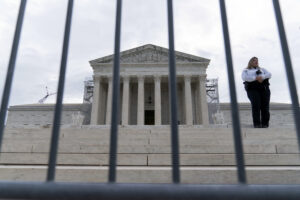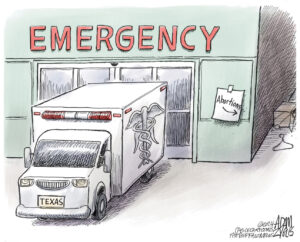The Abortion Shuffle
Rudy Giuliani's presidential campaign will put to the test the notion that a Republican candidate must be "pro-life" to attract a mainstream following.WASHINGTON — Why is it that abortion, a subject on which political candidates often claim to be expressing their most deeply held moral convictions, is often the issue on which they seem especially opportunistic and unprincipled?
In the campaign for the 2008 Republican presidential nomination, Mitt Romney, the former Massachusetts governor, has moved in a little over a decade from strong support of abortion rights (when he was running for Ted Kennedy’s Senate seat in 1994) to a point where he says he makes “no apology for the fact that I am pro-life.”
Rudy Giuliani’s support for abortion rights seems more constant, but his position, too, has evolved over the years, as Ray Rivera reported [http://www.nytimes.com/2007/02/10/us/politics/10rudy.html?_r=1&oref=slogin] in The New York Times on Saturday.
Reappraisals and conversions are not confined to Republicans. Both Al Gore and Richard Gephardt altered their positions on abortion over the years to bring their views into line with Democratic primary voters, who predominantly support abortion rights.
I don’t mean to pick on four public servants who are certainly not alone in doing some version of the abortion shuffle. All of them may be thoroughly sincere in rethinking their old positions.
But there is something systematic about the willingness of politicians to adapt their views on abortion to suit the preferences of whatever electorate they are facing at any given time. The reason: Our political system has created strong incentives for candidates to be less than candid about what they really think.
To begin with, candidates are rarely willing to say outright what’s true for so many of them: that they do not consider abortion the most important issue in politics and it is not the reason they entered public life.
Of course there are exceptions, such as Rep. Chris Smith, a New Jersey Republican who began his political career as executive director of the New Jersey Right to Life Committee. Plenty of Democrats entered politics primarily because of a mix of commitments related to social justice, poverty, labor rights, healthcare, civil rights and the environment. Many equally principled Republicans were animated largely by skepticism of government interference in the marketplace, support for lower taxes and, in many cases, a belief in an assertive foreign policy.
Yet politicians who acknowledged that abortion was not one of their driving concerns would be denounced, oddly enough, as unprincipled.
Opponents of abortion would argue, properly from their point of view, that failing to see abortion as a central issue now is akin to denying the importance of slavery in the 1850s. Supporters of keeping abortion legal, again properly from their side, would see such a politician as shamefully defective in his or her commitment to women’s rights. As a result, politicians pretend to be deeply committed to a view even when they’re not.
Making abortion a party issue has also encouraged dissembling. In Britain and Australia, a politician’s stand on abortion is accorded “free vote” status, disconnected from party discipline. After all, it’s perfectly consistent for a progressive committed to broad public provision for the poor to believe that abortion is wrong. It’s equally consistent for a conservative opposed to government meddling in the marketplace to support a woman’s right to choose.
In theory, our parties do not enforce a single line on abortion and there are many pro-life Democrats and pro-choice Republicans. Last fall’s campaign represented a modest but healthy loosening of informal discipline on the subject. But presidential candidates searching for primary votes know they must hold to each party’s version of political correctness. Giuliani’s moderately pro-choice stand will test whether this is as much of a straitjacket as the demands of a party whip.
Finally, we don’t make it easy for politicians to admit, as most voters do, that abortion is an agonizing question. It’s not hard to share the concern of right-to-lifers for the value of human life from the moment of conception. It’s not hard to share the concern of abortion-rights advocates that a legal ban could endanger the health and the lives of women by driving abortions underground without much reducing their number.
My own imperfect solution to this dilemma is to favor public efforts to cut the number of abortions by encouraging contraception and offering much more support to women who want to bring their children into the world.
But it’s easy for me to take this less-than-pure position. I don’t have to run in a primary. As for the politicians, we have created a system that encourages many in their ranks to adjust their convictions to their political needs. And then we denounce them.
E.J. Dionne Jr.’s e-mail address is postchat(at symbol)aol.com.
Your support matters…Independent journalism is under threat and overshadowed by heavily funded mainstream media.
You can help level the playing field. Become a member.
Your tax-deductible contribution keeps us digging beneath the headlines to give you thought-provoking, investigative reporting and analysis that unearths what's really happening- without compromise.
Give today to support our courageous, independent journalists.






You need to be a supporter to comment.
There are currently no responses to this article.
Be the first to respond.